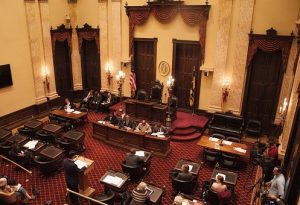The Extent of State University’s Immunity from Local Governance
 Montclair State University has spent the last decade or so trying to obtain approval from the County of Passaic and the City of Clifton to construct a roadway which would intersect with a county road. Both the County and the City raised concerns about the proposed development and Montclair State made significant efforts in an attempt to address those concerns. In 2014, Montclair State submitted an application to Passaic County for a permit to install traffic controls at the intersection.
Montclair State University has spent the last decade or so trying to obtain approval from the County of Passaic and the City of Clifton to construct a roadway which would intersect with a county road. Both the County and the City raised concerns about the proposed development and Montclair State made significant efforts in an attempt to address those concerns. In 2014, Montclair State submitted an application to Passaic County for a permit to install traffic controls at the intersection.
Montclair State did not seek permission from Clifton or Clifton’s Land Use Board based upon belief that, as a state organization, it was not subject to local regulations. Montclair State asserted this position largely based upon the 1972 New Jersey Supreme Court case of Rutgers v. Piluso.
The question in the Rutgers case was whether Rutgers University was subject to zoning ordinances of the town where it was located, Piscataway. Piscataway had an ordinance which restricted the number of matriculating students’ “family dwellings” Rutgers could have. When Rutgers sought to build more, the town denied the request, citing the ordinance. Rutgers then brought a suit seeking a determination from the court that Rutgers was not subject to local zoning ordinances because it was an instrumentality of the State of New Jersey.
The Supreme Court of New Jersey in the Rutgers case explained that the law is clear that “a state is not amenable to the zoning regulations of its political subdivisions.” Thus, Rutgers, as an instrumentality of the state performing a necessary governmental function, could not be restricted by local land use regulations.
In Montclair’s case, the trial court found that the county did not have the power to determine what speed limit would be designated for the road on Montclair’s property – since it was State land. The trial court also determined that the County could not refuse Montclair’s request for a permit to construct the intersection because it might generate more traffic. However, the trial court denied Montclair’s request for an order permitting the construction and ultimately dismissed Montclair’s complaint because it had not gone before the county and municipal planning boards.
Montclair State appealed the decision and the Appellate Division (New Jersey’s intermediate appeals court) agreed that the trial court judge had erroneously determined that Montclair had to bring the plans to the county and municipal boards for review. While a State University cannot exercise its immunity in an unreasonable fashion which would negatively affect important local interests, it needs only consult with the local government in an attempt to take actions that are compatible with the surrounding land uses. However, an objective difference of opinion regarding best methods to address local traffic safety concerns is not enough to find that the State University acted unreasonably. The Court found that Montclair State was not required to appear before local land use boards and that, in such circumstances, the courts should consider only whether the state entity satisfied its duty to reasonably consider legitimate local concerns.
The City of Clifton then appealed to the New Jersey Supreme Court. On August 6, 2018, the Supreme Court agreed with the Appellate Division and affirmed that Montclair State had qualified immunity from local land use regulations and that Montclair State needed to only reasonably address public safety concerns raised by the local governments.
Therefore the case now returns to the trial court to determine whether Montclair State’s plan for the construction is reasonable and considered the concerns of the local governments.
The attorneys at McLaughlin & Nardi, LLC are continuously staying abreast of new and evolving state and federal laws and can advise both businesses and individuals on the many varied ways that these laws may affect them. To learn more about what we may be able to do to help, please visit our website, or contact one of our New Jersey lawyers by e-mail or telephone at (973) 890-0004.
 New Jersey Lawyers Blog
New Jersey Lawyers Blog

